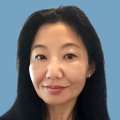For dermatologist Jenny Kim, MD, PhD, every aspect of her work — as a clinician, researcher, diversity champion and philanthropist — is personal.
A professor of clinical medicine at the David Geffen School of Medicine at UCLA, Dr. Kim specializes in skin immunology, a field she was inspired to pursue after her father’s health struggles.
He passed away while awaiting a liver transplant, just three months before his daughter was set to start medical school, and she originally planned to study immunology as it relates to transplant surgery.
Dr. Kim graduated from UCLA’s medical school in 1991. She now specializes in skin immunology and often cares for transplant patients with skin cancers.
“I really wanted to do research and learned that dermatology was a lot of immunology,” she says. “I also learned that skin is the largest immune organ and I just became really, really interested.”
In her namesake lab, Dr. Kim studies how skin inflammation – from acne to cancer – can lead to disease. She also teaches future dermatologists how to treat skin cancer as the program director for the micrographic surgery dermatological oncology fellowship.
As director of the Cosmetic Dermatology Program at UCLA, Dr. Kim sees firsthand how skin conditions — including acne, psoriasis, eczema, vitiligo and alopecia — affect patients’ self-esteem.
Some of her patients have been troubled for decades by acne scars. “It affects them years down the road,” she says. “And that’s not just for acne, but any skin condition. That’s something people face all their lives, not just when they’re young.”
Dr. Kim’s empathy for people affected by the appearance of their skin led her, in 2001, to create Camp Wonder, a summer camp for children with severe skin diseases, including epidermolysis bullosa, which causes widespread, painful blistering.
“It leads to very early death in young people, and usually kids with epidermolysis bullosa pass away in their 20s -- if they’re lucky -- and they live in pain. So we really wanted to do something to work with these children,” she says.
“Sometimes, it takes us four to five hours to change their dressings, each one of them,” Dr. Kim says. “It’s a lot of work but thanks to the hundreds of dedicated volunteers and amazing campers, we have the best camp. For some kids, they have never experienced anything like this. It’s their first time swimming, their first time riding horses, climbing a rock wall or performing at a talent show. They get to just be kids and are accepted into a community with no judgement that empowers them to live beyond their illness.”
Camp Wonder also serves as a learning opportunity for medical students, nurses and residents from UCLA, USC, UCI, UCSF and Navy medical. It helps young doctors and health care workers better understand their patients, Dr. Kim says: “They just have a glimpse of what a patient’s life is like in the clinic, but when they live with campers for a week they learn more about the daily impacts of disease. Many people say Camp Wonder changes their lives.”
Dr. Kim also is working to make a difference as a diversity champion at the David Geffen School of Medicine at UCLA, where she’s been active with Equity, Diversity and Inclusion efforts for the past decade. She is one of the founders of the recently formed EDI committee within dermatology.
As an immigrant, and as a woman in the sciences, Dr. Kim says connects deeply with the challenges members of marginalized communities face and the promise that institutions such as UCLA can deliver.
“I really believe that diversity is good in every way — not just race and gender, but our own stories and ideas,” she says. “That’s really what academic institutions are about: having diverse ideas and creating a place where we all contribute to the richness of the environment for teaching, research, caring for the community and to make things better.”




